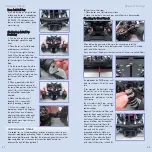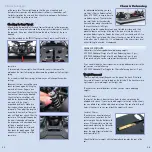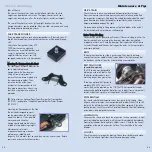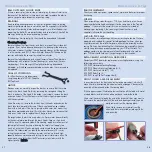
S
Sh
ho
occk
k D
Da
am
mp
piin
ng
g
Shock damping influences the responsiveness of the chassis during
cornering, and helps to maintain proper contact between the tire and the
road surface during vertical movement. No shock damping means that the
spring rate determines how long it takes for the spring to compress and the
suspension to reach a stable position.
Setting the right damping is always a compromise and requires a lot of
"hands on" experience.
Damping only comes into play when the suspension is moving, and loses its
effect when the suspension has reached a stable position. When the shock is
compressing or rebounding (decompressing), the shock absorber oil resists
this movement. The two factors that determine the speed at which the shock
reacts are the thickness of the oil and the piston valving (the number of holes
in the shock piston the oil passes through).
D
Daam
mppiinngg aanndd SShhoocckk PPiissttoonnss
Shock dampening manages the resistance of the shock as the piston moves
up and down through the oil in the shock body.
•• SSoofftt ddaam
mppiinngg:: Produces the most grip (both front and rear) through chassis
roll, but also decreases cornering speed.
•• H
Haarrdd ddaam
mppiinngg:: Allows the car to break traction more easily, but with less
chassis roll and higher cornering speed.
Initial Settings:
Front shocks: 2 holes open (medium-
hard)
Rear shocks: 4 holes open (softest)
Initially, the damping should be set
separately for the front and rear so
the car quickly settles when dropped
from approximately 5 cm (2"). If the
car bounces before settling, the
shocks are too stiff. If the bottom of
the chassis hits the table, the shocks
are too soft.
Shock pistons affect shock damping
by affecting how easily the piston
travels through the shock oil when
the shock is compressed or is
rebounding (decompressed). The
piston has holes through which shock
oil flows as the piston travels up and
down inside the shock. The number
of holes helps control how quickly the
shock compresses or rebounds.
•• LLeessss ppiissttoonnss ooppeenn:: Harder damping, reacts like using thicker shock oil.
•• M
Moorree ppiissttoonnss ooppeenn:: Softer damping, reacts like using thinner shock oil.
Final Adjustments
R
Re
ea
arr S
Sh
ho
occk
kss --
U
Up
pp
pe
err M
Mo
ou
un
nttiin
ng
g P
Po
ossiittiio
on
n
There are five upper shock
mounting positions on the rear
shock tower.
Initial Setting:
Rear shocks: Position #3
R
Re
ea
arr S
Sh
ho
occk
kss --
LLo
ow
we
err M
Mo
ou
un
nttiin
ng
g P
Po
ossiittiio
on
n
There are three lower shock
mounting positions on the rear
lower arms.
•• O
Ouutteerr ppoossiittiioonn #
#33:: Harder
damping, less grip, less chassis
roll. Stability decreases. High-
speed cornering (traction
permitting) increases.
•• M
Miiddddllee ppoossiittiioonn #
#22:: Optimum position for most tracks.
•• IInnnneerr ppoossiittiioonn #
#11:: Softer damping, higher stability. Traction increases,
chassis roll increases. Not good for fast corners.
Initial Setting:
Rear shocks: Middle position (#2)
S
Sh
ho
occk
k O
Oiill
•• TThhiicckkeerr ooiill:: Slower shock action, slower chassis weight transfer from side-
to-side or front-to-rear. In general, slower shock action means less
traction, but slower weight transfer means the car is less likely to become
unsettled with sharp direction changes such as in chicanes.
•• TThhiinnnneerr ooiill:: Faster shock action, faster chassis weight transfer. Faster shock
action means the suspension can work faster to keep the tire in contact with
the surface quicker, resulting in more traction. However, the chassis is more
susceptible to chassis roll and becoming unsettled in sharp direction
changes such as in chicanes.
Thicker shock oil requires the use of heavier springs to compensate for the
heavy damping action. Likewise, thinner oil requires lighter springs.
We recommend using only highest-grade XRAY Silicone Shock Oil, which is
available in numerous weights. This shock oil is specially formulated to be
temperature resistant and low-foaming.
Final Adjustments
14
13
1
2
3
4
20W
(#30 9520)
30W
(#30 9530)
40W
(#30 9540)
50W
(#30 9550)
1
12 3
23
45
Summary of Contents for T1R Raycer
Page 1: ......






































